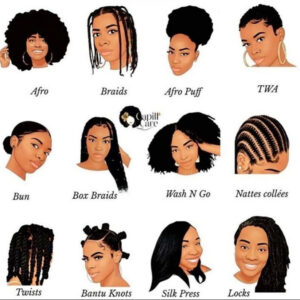
Shakayla Robinson, a senior business student at Florida A&M, takes her hair seriously.
“Hair means everything to me. To me hair represents who I am as a person. It represents how you as a person care for yourself,” Robinson, a hairstylist, said.
Hair means many different things to many different people. It can symbolize a new phase in life or simply be an inspired look from someone else or from different sources of media.
Hair is also a form of self-expression, creativity and a confidence booster.
In the Black community especially, hairstyles and hair care contribute a great deal to lifestyles and individualistic or community-based pride.
Black spaces on a small- or large-scale present and accept the most unique forms of hair, hair styles, and entrepreneurship.
Historically Black colleges and universities foster the history and pride of hair. Florida A&M University is a highly populated place full of character and style. Hair plays a huge role in this cultural element.
Among a sea of people you are guaranteed to see something unlike anything you’ve seen before. Throughout history, Black people were made to believe their features were not the standard and often ridiculed for their natural hairstyles. However, the total opposite impact was had within the community.
“As Black women, we have been judged for the natural look for many years and now it’s a trend to actually be natural,” Robinson said.
Between the 1700s-1800s women enslaved or free wore their hair covered from harsh work conditions, or to show they were part of the slave class. The 19th century is where you began to see the taming of black hair, but it was also becoming a luxury self-treatment.
As time progressed, and we investigate the now, judgments still stand and have now grown into the dissatisfaction of unique hairstyles, and unnatural hair colors.
“I’ll spend $300 plus on my hair and trust me when you see me you’ll know that I spent a pretty penny for my hair,” Robinson said.
There are even restrictions to certain hairstyles such as afros and locs in certain professional spaces further tying to the issue of racial discrimination. Unfazed, individuals still value their own sense of style, and image.
According to the NAACP Legal and Defense and Educational Fund, laws such as The CROWN Act, which stands for “Creating a Respectful and Open World for Natural Hair,” is a law that prohibits race-based hair discrimination, which is the denial of employment and educational opportunities because of hair texture or protective hairstyles exist.
Because of discrimination in these spaces, many women are cautious about their sense of style and tend to tailor it to be more fitting.
“For the longest time it was just hair, but after a while it was like my hair is me, especially when I started coloring it, dying it, and cutting it in different ways,” said FAMU senior Mikayla Jenkins.
Identity is another key element to taking pride in hair. Many find themselves or are known based on their hair for the day, week, month or year.
“People started knowing me for having my colored hair and for picking crazy colors not being afraid to try new colors,” Jenkins said.
Influence and inspiration go hand in hand when it comes to self-image and self-representation. Whether it be a trend or simply an act of representation, hairstyles all originate from somewhere.
“Im looking for a change, I’m graduating and about to start a new chapter in my life so let’s start a hair journey that goes along with this new chapter,” said Jenkins, who is closing her senior year with the startup of locs.
Hair plays a role in all phases of life. This very matter makes for a statement along with an everlasting image.